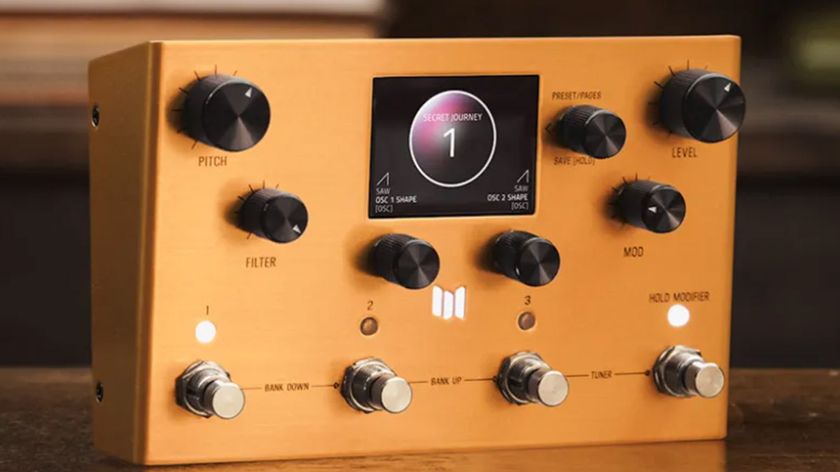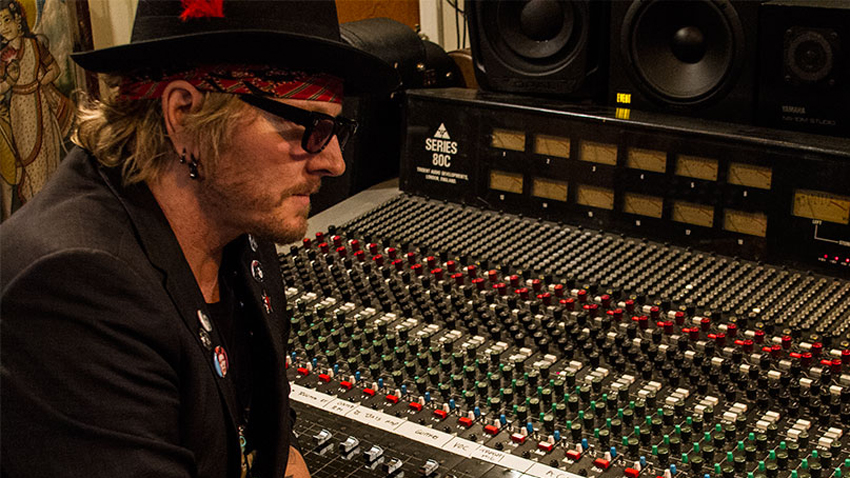
Matt Sorum is aware that he's mainly known to the public as the hard-hitting, inventive drummer for Guns N' Roses, Velvet Revolver and The Cult, but he's hoping that his next endeavor, a new solo album that he recently began recording in his well-appointed home studio, will change all of that.
"I want to give people another side to Matt Sorum," he says. "I'm not just this rock drummer guy. I've done a lot of other things, like producing Poe and Tori Amos and others. There's a lot of styles that I work in, and so it's time to bring that out."
The upcoming album isn't Sorum's first time to the rodeo: in 2004, he released Hollywood Zen, an impressive debut that displayed the drummer's sharp singing and writing skills, and featured guest appearances by his GN'R/Velvet Revolver mates Slash and Duff McKagan. On the new set, Sorum is keen on emphasizing shifting aesthetic changes and his emotional responses to world events.
MusicRadar sat down with Sorum recently to talk about how the album is starting to shape up, why he's not playing drums on his own songs, what it was like to sing with Ringo Starr and how he's using music to give back to others.
How did the new songs and the idea for a record come about?
"I started writing it within the last couple of years. I went out to the desert because of Gram Parsons and all those guys - you know, the Joshua Tree, Palm Springs area - and I had an amazing time working there. I went to a trippy old hotel and wrote eight songs in five days. A lot of people don't know me as a songwriter, but I've always been a guitar player. I like to dabble with the acoustic. The stuff that I've written for Velvet Revolver - like Set Me Free, and Spectacle and a few on the first record - those were done on an acoustic.
"I made a record with another guy called Hollywood Zen, and that was my first attempt to do my own thing. I was a bit nervous, though, so I can't really say that it was my record - it's a collaboration. My main goal on this record is to write everything myself.
Get the MusicRadar Newsletter
Want all the hottest music and gear news, reviews, deals, features and more, direct to your inbox? Sign up here.
"What's been happening with me is, I'm getting older, and I'm a different guy… I'm not on drugs and alcohol anymore. [Laughs] I'm more spiritual. I'm thinking about the planet and caring about other people more, and I've got a charity… And that sparked a lot of lyrics. I have a song called Lady Of The Stone, which is about Mother Nature's perspective on what's happening to the planet. What would she say if she was watching?
"I wrote another song called Land Of The Pure. I was very struck by what happened with the girl Malala [Yousafza] from Pakistan. I wrote it about the girls in Pakistan - young girls all over the world - who are not being allowed to be educated. I'm going to have a singer named Atif Aslam, who's from Pakistan, sing on it. That's very eclectic. There's going to be a lot of percussion and orchestration. People are going to trip to it."
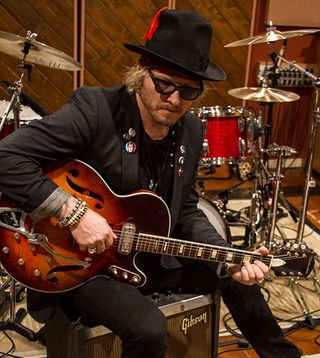
"I want to have a producer's perspective," says Sorum of his decision to forgo drumming on his new record. "I don't want to sit there and analyze my drumming." © Rocco Guarino
"For the second part of my trip, I hung out on the beach. I stayed at a little hotel called the Surf and Sand Hotel - I used to go there in the early '70s with my grandparents. While there, I wrote a song called The Sea. I remembered how much I loved the beach as a kid. Nothing seems to matter when you're on the beach.
"I wrote another song there called Blue. I was thinking, Why does the word 'blue' always mean sadness? I wrote it as a positive thing - the sky, the water. It's a Tom Petty meets David Gray kind of song. It's pretty cool.
"And I wrote a song called Josephine, which is my grandmother's name. She and my grandfather were married for 69 years. The song is about him being in the orchestra pit, he was in the band, and her being a ballerina. They met in the 1920s. My grandmother just turned 100. The song is going to be all orchestra and piano. It's an ode to them."
I understand that you're not going to play drums on the album. Why is that?
"I feel like it's not right for this record. I want to have a producer's perspective, so I don't want to sit there and analyze my drumming. I've been rehearsing the band, I put a great band together. I've got a drummer named Brian MacLeod, who's played with everyone from Sheryl Crow to Linda Perry - he's been on tons of records. He's got more of that gift. I'm a rock drummer, but I can play other styles. He can play more organic, singer-songwriter stuff. As light as I play, I have a sound that might be more rock."
As a producer, do you tend to be hard on drummers - because you're a drummer?
"Because I pick such great players, I hear their perspectives. I think the art of producing is about picking the right guys. It's like making a movie - who is the right group of actors to use? There's going to be a lot of layered percussion on the album.
"I've got Brian, and then I hired a percussionist named Scott Breadman - he's played with Jose Feliciano and Lindsey Buckingham. He's fantastic. And I also hired an incredible bass player, Paul Ill. He's played with Linda Perry, Christina Aguilera - he's one of the most underrated guys out there. The guitar player is a guy named Randy Mitchell, who's also worked with Linda Perry a lot. He's one of those guys who, if you go, 'Can you make it more Neil Young,' he'll go, 'OK, cool.'"
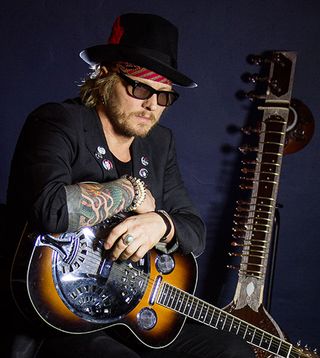
"I've always sung," says Sorum. "Vocals set the tone for me." © Rocco Guarino
You've also said that you're not really making a rock record. Is this representative of what you listen to in your personal life?
"I don't listen to a lot of rock 'n' roll, but when I do, it's always the greats. My favorite station to listen to is Alt Nation on Sirius. I love rock 'n' roll, and I love playing it - there's a certain energy from being on stage that's incredible. There's a song on my album called Ode To Nick Drake, and that's kind of more what the record is going to be like. It's stripped-down, orchestrated, with a horn section and percussion.
"The way I sing… I can't say I'm the kind of guy who's going to go out there and belt out a rock song. I have to write the kinds of songs that are right for my voice, which is low and… it's not like Leonard Cohen, but I do sing down in that range."
Are you a confident vocalist? A lot of times, when musicians who aren't known for singing can be a little tentative when they step up to the mic.
"Well, I've always sung. As long as I can remember, I've always been on stage singing. My mother was a vocal teacher and a classical pianist. My grandfather was a Professor of Music at Long Beach State University. So I grew up in a classical background, took vocal lessons and was in the choir. When I got in bands, I ended up singing harmonies. If you listen to the Guns N' Roses records that I'm on, I did most of the harmonies. And Velvet Revolver - I always sang on stage with them.
"Vocals set the tone for me. If you ask a lot of drummers, like Ringo Starr, for example, he'd say that he listens to the vocals. That's where the tempo of the song is. If you play a song too fast, a singer can't work with it. I've always been that kind of guy - I play to the song."
It's interesting that you mention Ringo. I think he's probably the best singing drummer ever.
"I have to tell you, I went on stage with him last year. When I saw him as a kid, he was the guy who made me want to be a drummer. I've gotten to know him over the last few years. I went to see him at the Greek Theatre, and I got a backstage pass. Inside was a note asking me to join him on stage.
"So I went up. Greg Bissonette was on drums, and I was up there with Micky Dolenz, Edgar Winter, Gary Wright, Todd Rundgren, all of these great guys, and we sang With A Little Help From My Friends - I was right next to Ringo. It was incredible! [Laughs] It was the next level. I love what Ringo is doing. He writes songs, he sings them… I don't want to do the Dave Grohl thing. I want to go up with an acoustic and play songs that hopefully people will dig."
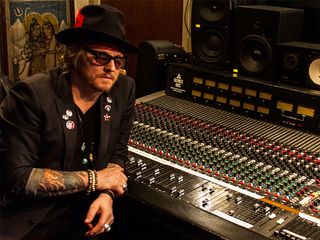
Sorum's home studio features a 56-channel Trident console. © Rocco Guarino
Let's talk about your drumming a bit. At this point, do you have to practice at all? Do you ever feel that you have to keep your chops up?
"You know what's been the best for me? Camp Freddy. I've been playing with Camp Freddy for almost 10 years. What I love about it is… when I was a kid, I would get an album, I'd put on my headphones, and I'd play to it and I'd learn everything about it. But I kind of forgot about that as I got in a band - I got away from it 'cause I was playing. With Camp Freddy, I went back and was able to play all of those amazing songs with some of those artists.
"Alice Cooper came up one night. We did Billion Dollar Babies and No More Mr. Nice Guy. He turned to me and said, 'That's the best I've heard those songs since we made the record.' And I said, 'Well, I learned the record exactly like it.' Listening to the albums and going over the music has made me a better drummer again."
Do you feel as though age has made you a more mature drummer?
"Well, I've never been a show-off drummer, never been the fancy-schmantzy guy. I've always liked being a guy in a band, being a part of a band and being a personality in a band. My heroes were John Bonham and Keith Moon. At times did I act like that? Well, yeah. That's the spirit of rock 'n' roll. Now, I'm like, 'OK, I've done that.' That's how I felt at the Rock And Roll Hall Of Fame - it was a lot of relief. There was a lot of pressure taken off of me. I think for everybody who was up on that stage, we went, 'Well, we can let this go now.'"
In addition to music, you've been pretty involved with charity work the last few years.
"Yeah, and that's changed my life. For me, a guy who's been in a rock 'n' roll band, most of the world is spinning around you at the time… I got on Twitter, and I heard from all of these kids, and I started talking to them, and it was like, 'Wow, I really affected a lot of people's lives with music.' Through that, I wanted to give back. I formed a charity called Adopt The Arts - I've got two branches, Adopt The Arts and Global Sound Lodge - and I give instruments and music to public schools. I have a pilot school, and I'm their main guy, so I go up and hang with the kids and play music with them.
"I love it. I go there and forget about any worry that I have. What's happening is, they're trying to cut arts out of the public school system. A lot of these kids in the LA public school system are underprivileged and lower-income - they don't have a lot of hope. If kids have music and art, 52 percent of them will go on to college - that's a fact. That they're trying to cut music and art is really scary. Not to say that they're going to be rock stars, but music sparks the brain. They could be the next Steve Jobs.
"My ancillary of Adopt The Arts is Global Sound Lodge. I do women's shelters, and right now I'm working with the Wounded Warriors. With Wounded Warriors, I'm doing a music therapy program with a lot of the guys - I'm doing a documentary on it right now. The suicide rate in the military is close to one every couple of days because of post-traumatic stress disorder. But music is a very strong healing force.
"I brought a bunch of guys in the studio and we recorded a really heavy song. And I'm working with a couple of other guys on a country song. They're writing lyrics. To see the inspiration in these guys… a lot of them aren't able to open up. They can't talk to somebody and tell them what's going on. With lyrics, they can get out their inner feelings. It's really cool, and it's helping a lot of them. It's pretty heavy."
All photos by Rocco Guarino. Visit his website here.
Joe is a freelance journalist who has, over the past few decades, interviewed hundreds of guitarists for Guitar World, Guitar Player, MusicRadar and Classic Rock. He is also a former editor of Guitar World, contributing writer for Guitar Aficionado and VP of A&R for Island Records. He’s an enthusiastic guitarist, but he’s nowhere near the likes of the people he interviews. Surprisingly, his skills are more suited to the drums. If you need a drummer for your Beatles tribute band, look him up.

"Reggae is more freeform than the blues. But more important, reggae is for everyone": Bob Marley and the Wailers' Catch a Fire, track-by-track

“Part of a beautiful American tradition”: A music theory expert explains the country roots of Beyoncé’s Texas Hold ‘Em, and why it also owes a debt to the blues
Most Popular









